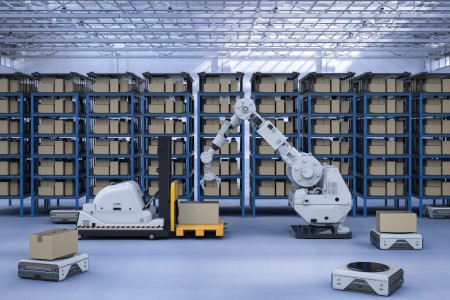AI in Delivery, Shipping, and Courier Companies
What is Artificial Intelligence (AI)
Artificial Intelligence (AI) refers to the simulation of human intelligence in machines that are programmed to think like humans and mimic their actions. The term can also apply to any machine that exhibits traits associated with a human mind such as learning and problem-solving.

What role does AI play in the Delivery, Shipping, and Courier Industry
In the delivery, shipping, and courier industry, AI is revolutionising processes, enhancing efficiency, reducing costs, and improving customer experiences. By automating tasks, optimising logistics, and providing data-driven insights, AI is transforming the way goods are transported and delivered.
4 Ways AI is Used in the Shipping Industry
1. Automated Warehousing
- Robot-assisted picking and packing: Robots equipped with AI are used in warehouses to locate, pick, and package goods. These robots can work round the clock, reducing human error and increasing productivity.
- Inventory management through AI algorithms: AI systems analyse data to predict inventory needs, track stock levels in real-time, and suggest reordering schedules, thereby optimising inventory management.
2. Route Optimisation and Fleet Management
- AI-driven algorithms for optimal route planning: AI algorithms analyse various factors like traffic conditions, weather, and delivery windows to determine the most efficient routes for delivery vehicles.
- Predictive maintenance for vehicles: AI tools monitor the condition of delivery vehicles and predict when maintenance is needed, preventing breakdowns and prolonging vehicle life.
3. Autonomous Delivery Vehicles
- Drones and self-driving vehicles in last-mile delivery: Companies are experimenting with drones and autonomous vehicles to handle last-mile deliveries, aiming to reduce delivery times and costs.
- Safety and efficiency improvements: Autonomous delivery vehicles can potentially reduce accidents caused by human error and increase the efficiency of the delivery process.
4. Freight Matching and Load Optimisation
- AI platforms for matching shipments with carriers: AI-driven platforms can automatically match shipment loads with available carriers, optimising logistics and reducing wait times.
- Maximising cargo space and reducing empty miles: AI helps in load optimisation, ensuring that cargo space is used efficiently and reducing the number of trips with empty loads, which saves fuel and reduces emissions.
3 Ways AI Will Benefit Customers
1. Faster Delivery Times
- AI-enhanced logistics leading to quicker deliveries: Artificial intelligence streamlines logistics processes, from warehousing to transportation, enabling companies to expedite delivery times significantly. By optimising routes, predicting traffic patterns, and managing warehouse operations more efficiently, AI reduces the time from order placement to delivery, directly benefiting consumers.
- Impact on consumer expectations and satisfaction: The acceleration of delivery services sets a new standard in the industry, raising consumer expectations for speed and convenience. This shift not only enhances customer satisfaction but also increases the competitive pressure on companies to leverage AI for faster deliveries.
2. Personalised Delivery Experiences
- AI-driven predictive analytics for personalised delivery schedules: By analysing customer preferences and historical data, AI can predict optimal delivery times, offering consumers more personalised scheduling options. This level of personalisation enhances the customer experience, making it more convenient and tailored to individual lifestyles.
- Real-time delivery tracking and customer communication: AI enables more sophisticated tracking systems, providing consumers with real-time updates on their deliveries. Enhanced communication through AI-driven chatbots and notifications keeps customers informed and engaged throughout the delivery process.
3. Enhanced Security and Transparency
- AI in preventing package theft and loss: Through surveillance systems and predictive analytics, AI can significantly reduce the incidents of package theft and loss. It enhances the security of the delivery process, giving consumers peace of mind when ordering products online.
- Improved accountability through transparent tracking: AI technology allows for more transparent tracking of shipments, offering consumers detailed insights into the journey of their packages. This transparency fosters trust between consumers and companies, ensuring a more accountable delivery process.
AI in Logistics Companies' Operations
1. Supply Chain Optimisation
- Predictive analytics for demand forecasting and inventory optimisation: AI analyses trends and predicts future demand, enabling companies to optimise their inventory levels and reduce waste. This foresight helps in maintaining the right stock levels, ensuring timely deliveries and minimising holding costs.
- Enhanced supplier selection and management through AI: AI tools can evaluate suppliers based on various performance metrics, aiding logistics companies in choosing the most reliable and efficient partners. This optimisation ensures smoother operations and can significantly enhance service quality.
2. Cost Reduction and Efficiency
- AI's role in reducing operational costs: By automating routine tasks, optimising routes, and enhancing decision-making, AI helps logistics companies reduce operational costs. These savings can be redirected towards innovation or passed on to consumers in the form of lower prices.
- Enhanced efficiency in logistics operations: AI enables logistics companies to streamline their operations, from warehouse management to transportation. This increased efficiency leads to faster delivery times, reduced errors, and improved service quality.
3. Data Analytics and Decision Making
- Leveraging big data for strategic decision-making: AI tools can analyse vast amounts of data to uncover insights that inform strategic decisions. This capability enables logistics companies to anticipate market changes, adapt to consumer demands, and innovate proactively.
- AI's role in identifying trends and making predictive analyses: By identifying patterns and trends in data, AI helps companies anticipate future challenges and opportunities. This foresight can be pivotal in maintaining a competitive edge in the fast-paced logistics sector.
What are the Latest AI Trends and Innovations in Logistics
1. Advancements in AI and Machine Learning Technologies
Potential Future Applications in the Shipping Industry
The shipping industry stands on the brink of a new era with AI driving significant advancements. Future applications could include more sophisticated autonomous ships and drones, enhanced predictive analytics for global trade flows, and even smarter warehousing technologies that further streamline operations. AI is expected to evolve from assisting in decision-making to making autonomous decisions based on real-time data, potentially revolutionising how goods are transported globally.
Integration of AI with Other Emerging Technologies like Blockchain and IoT
AI's integration with blockchain can introduce unprecedented levels of transparency and security in the shipping industry, facilitating seamless tracking of goods and authenticating transactions. Combining AI with the Internet of Things (IoT) promises enhanced connectivity and real-time data exchange, enabling smarter asset tracking, improved fleet management, and predictive maintenance, thereby reducing downtime and enhancing operational efficiency.
2. Sustainability and AI
Using AI to Promote Eco-Friendly Logistics Practices
AI has the potential to drive sustainability in logistics by optimising routes to reduce fuel consumption and emissions, suggesting the most eco-friendly modes of transport, and enhancing the efficiency of warehousing and distribution. By analysing vast datasets, AI can identify patterns and suggest changes that significantly reduce the environmental footprint of shipping operations.
AI's Role in Optimising Resource Usage and Reducing Emissions
Beyond logistics and transportation, AI can optimise resource usage in the entire supply chain, from predicting the optimal amount of inventory to reduce waste to suggesting the best materials and practices for packaging. AI's predictive capabilities can also be harnessed to forecast demand more accurately, thus minimising overproduction and reducing excess inventory, contributing to a more sustainable global shipping industry.
The Future of AI in Logistics
AI has already begun transforming the shipping and delivery sector by enhancing efficiency, reducing costs, and improving customer satisfaction. From autonomous delivery vehicles to AI-driven logistics planning, the integration of artificial intelligence has enabled a leap in operational capabilities and service offerings, setting a new standard in the industry.
The future of AI in logistics looks promising, with continued innovation expected to bring even more profound changes to the industry. The integration of AI is not just about technological enhancement but also about driving a more sustainable, efficient, and customer-focused shipping industry. As AI technologies evolve, they are set to redefine global trade, logistics management, and the very nature of work in the shipping sector, promising a future where the digital and physical elements of logistics are seamlessly integrated for optimal performance.
